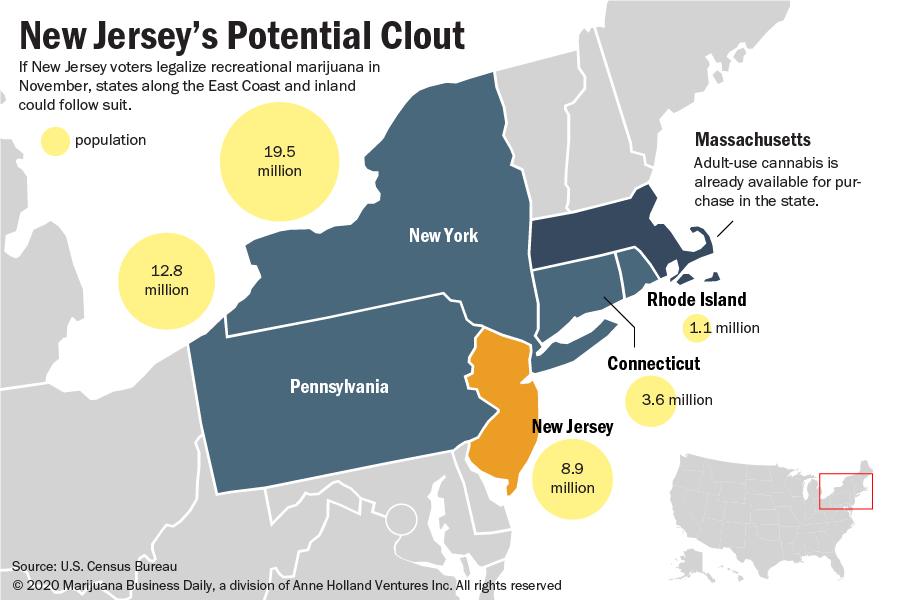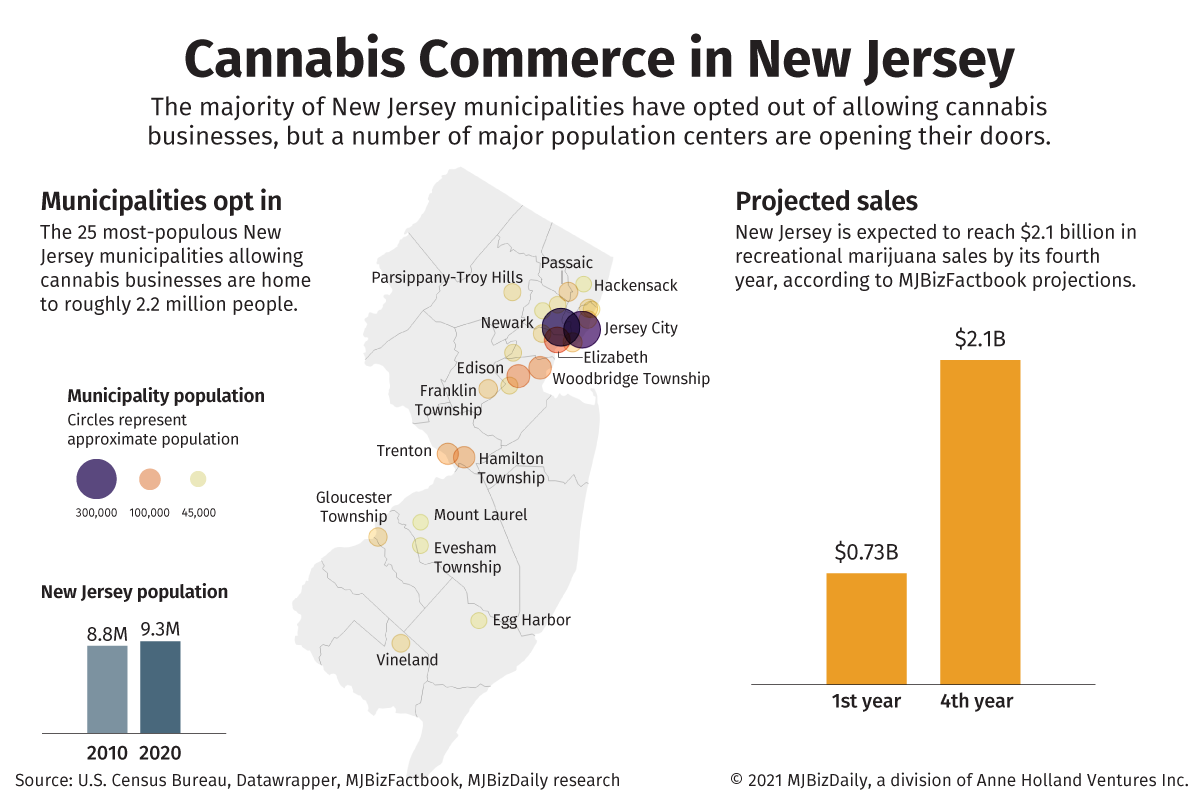A look into New Jersey’s market, its long journey towards legalization and the expectations for its future.
With federal legalization still being far from home, the industry is slowly getting its footing while jumping through various regulatory hoops.
In December 2020, New Jersey has joined the family of 18 states to legalize recreational cannabis by passing “The New Jersey Cannabis Regulatory, Enforcement Assistance, and Marketplace Modernization Act,” known as the CREAMM Act. However, what seems to be the last hurdle passed is still quite a road ahead.
NEW JERSEY’S MEDICAL HISTORY
In January 2010, outgoing Governor Jon Corzine signed the Compassionate Use Medical Marijuana Act, allowing the use of medical cannabis for patients with terminal conditions which are chronic and debilitating. Initial enrollment in the medical program was small due to costs, rigid program limitations, too few to little doctors’ recommendation, and resistance by then New Jersey Governor Chris Christie. In 2011, New Jersey was dubbed as having the strictest medical law among the 16 states at the time with a state medical program.
As of 2015, the medical program successfully registered 5,540 patients and 355 caregivers permitted to purchase on behalf of incapacitated patients. And as of 2017, the state registered 11,659 qualified patients. Til the year of 2017, New Jersey has issued contracts to six non-profit alternate treatment centers, allowing exclusive rights to produce and sell medical cannabis in the state.
In July 2019, a measure to expand medical cannabis program was signed into law by then Governor Phil Murphy. Named as the Jake Honig Compassionate Use Medical Cannabis Act, the expansion added more than 20,000 medical patients, bringing the total to over 63,000 and increased over 100,000 patients, 1,259 doctors and 3,390 caregivers in 2020.
In 2019, the Garden State added 24 new medical business licenses, from which were 4 vertically integrated, 5 stand-alone cultivation facilities and 15 dispensaries. In 2021, the Cannabis Regulatory Commission doubled the proposed number of cultivation sites, with 14 new medical business licenses and 30 medical dispensary licenses.
The New Jersey medical retail market achieved an estimated $30 million sales and almost $100 million in 2019. However, retail sales figure from the following years, 2020 and 2021, were not publicly released, but many could assume the growth.

ONWARDS TO RECREATIONAL LEGALIZATION
The first eight years of New Jersey’s medical market were lackluster in growth and not entirely sufficient. It only was when Governor Phil Murphy signed the “Jake Honig Compassionate Use Medical Cannabis Act,” in 2018 that it overhauled the previous medical operations and improved access and distribution for medical cannabis. Since then, recreational legalization was just a matter of time.
In December 2020, the Garden State passed the New Jersey Cannabis Regulatory, Enforcement Assistance, and Marketplace Modernization Act,” known as the CREAMM Act to legalize recreational use in response to overwhelming voters’ support. Then in February 2021, Governor Murphy signed various adult-use reform bills into law, including the groundbreaking CREAMM Act which legalizes adult-use and possession, as well as NJ Assembly Bill A1897 which decriminalizes possession. The Governor also signed S3454, clarifying use and possession penalties for individuals younger than 21 years old.
The critical factor that CREAMM Act allowed New Jersey to pave the way towards recreational legalization was the establishment of the New Jersey Cannabis Regulatory Commission (CRC) to “establish rules and regulations governing the sale and purchase of recreational cannabis.” The CRC also oversees the state’s medicinal program and licensing process for the state’s entire industry.

Essentially, there are seven classes of licenses offered by the CRC: Cultivators, manufacturers, wholesalers, distributors, retailers, delivery and conditional (an interim license with 120-day operational window while applying for a license at the same time). In December 15, 2021, The CRC began accepting licenses for cultivators, manufacturers and test lab operators, with nearly 500 individuals or entities filed applications in the first four hours when it first opened. While applications for dispensary licenses will not open until March 15, 2022, wholesale, delivery, and distribution license applications have yet been given a timeline.
While the commission can only allow 37 licenses for cultivators before February 2023, there is no limit on the number of licenses the commission can award to manufacturers, test lab operators or dispensaries. Priority will be given to microbusinesses (10 or less employees with 2,500 sq ft or less operation space), conditional license operators, and social equity applicants (owned by people living in Economically Disadvantaged Areas).
According to New Frontier Data, it was estimated that New Jersey, with a population of 9 million, has a million of cannabis consumers in total. The legal adult-use market is projected to generate $773 million revenue in the first year, growing more than $1.8 billion by 2025. In 2019, the state’s medical market accounted for $77 million in retail sales. The legislation of the Garden State allows local municipalities to assess an additional 2% on sales tax, generating several hundred thousand of dollars in tax revenue just by having a dispensary in town.
STILL A LONG WAY TO GO – RESISTANCE REMAINS
The road towards a flourishing New Jersey’s recreational industry is facing push-backs from municipalities. Local New Jersey municipalities hold the power to allow/disallow and regulate licensed operations in its territory: This means that licenses cannot be issued by the CRC to towns that vote not to allow cannabis businesses. All NJ municipalities were given a deadline of August 21st, 2021 to provide their stances on cannabis.
Although New Jersey voters approved recreational legislation by a margin of 2 to 1, many individual towns were hesitant to allow businesses so close to home. About 400 (71%) of New Jersey communities have banned the adult-use businesses, while 100 (17.75%) have allowed for whole business operations, mostly in southern and central part of the state. One critical aspect that local leaders are opting out is because of the five-year moratorium that went into effect after August 21: Any town that opted in will be locked into the decision for five years while a town or community that opted out could later change its mind. Hence, some mayors are taking a “wait-and-see” approach once operations begin in the coming months.
WHEN CAN I BUY RECREATIONALLY IN NEW JERSEY?
Unfortunately, there is no certain answer for that yet.
Given that March 15th, 2022 is when the CRC begins accepting retail licenses, it is safe to assume that operations will only take place a few months after. The safest bet will be the second half of 2023, assuming no more major hurdles to jump through.
After all, things are still uncertain at the federal level. The best thing to do is to be patient as reforms do not happen overnight. Despite how it may seem, the Garden State is surely making huge progress and significant developments will take place in 2022.
About Canna Brand Solutions
Canna Brand Solutions is an innovative custom packaging supplier and an official CCELL Distributor. We are a wholesale cartridge, battery, and packaging supplier, and more. Our passion to build lasting relationships with our partners motivates us to exceed your expectations, helping you grow your brand in this ever-evolving global industry.
With our deep experience in manufacturing and the cannabis industry, we offer adaptive custom packaging solutions, in-house design, and industry expertise to Cultivators, Extractors, Operators & Retailers.






